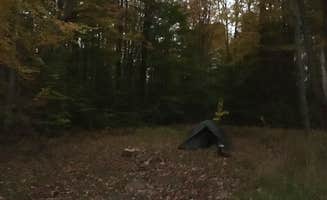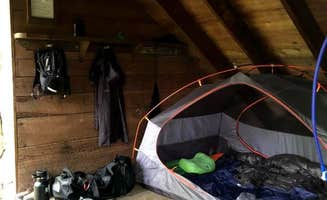Dispersed tent camping near Cooksburg, Pennsylvania offers varying terrain conditions that require preparation. Situated near the Allegheny National Forest region at elevations ranging from 1,200-1,600 feet, the area experiences significant seasonal changes, with spring often bringing wet conditions to forest floors. Winter camping is possible but requires additional gear as temperatures can drop below freezing for extended periods.
What to do
Hike to Hector Falls: Located about a mile from Forestry Road Dispersed Campsite, this 2-mile trail leads to a scenic waterfall area. "It's a nice little 2 mile hike. Some good exploring. Bring tick/bug spray. Found several on my boys and me," notes a camper.
Winter wilderness exploration: Cold-weather camping offers a different perspective of the forest. An experienced camper at Forestry Road shared: "Super peaceful. It was freezing, quite literally, with nights in the low teens. The melting and refreezing had made the roads and surrounding trails a little slippery so I would be cautious if traveling alone."
Explore logging roads: Many forest trails branch from main roads. "There are tons of logging roads that split off the main forest road. They mostly have gates that say 'Logging road, no public motor vehicles allowed' but they also say 'Foot travel is welcome,'" notes a visitor who found multiple potential camping spots along these paths.
Paddle access camping: For a unique camping experience, consider Private Island w/ Paddle Moor Co. where you can access sites by water. "The option to have lights on or off was also a joy. When it was dark (pitch black) you could see all the fireflies. To be honest that was like a show in itself."
What campers like
Seasonal variety: Weather patterns affect the camping experience significantly. At Loleta Road Dispersed Campsite, campers appreciate the changing conditions: "I've been camping here for 5 years now and it's always a good time," indicating the area's year-round appeal despite seasonal challenges.
Privacy balance: Many sites offer a compromise between isolation and security. A van camper noted about Loleta Road: "Living in a van looking for spots to stay this wasn't a bad one at all, good bit off the road, couple trails."
Shelter options: For those wanting more structure than traditional tent camping, Wolfkiel Run Shelters offers Adirondack-style accommodations: "The shelters are very peaceful in the winter and would highly recommend them if you are keen for some 'winter camping' but not keen to sleep in a tent or be completely exposed."
Weather resilience: Some campers embrace challenging conditions. One visitor to the area mentioned: "We spent the night during a tropical storm and got the pleasure of hearing the rain on the tent out in this peaceful spot!"
What you should know
Wildlife awareness: Bears are active in the region. A camper at Forestry Road reported: "There's black bears that live in the several caves in the area. I was meditating in my car one evening and a bear stood up and pushed against my window. Definitely be sure to pack up all food and trash at night."
Navigation challenges: Finding specific dispersed sites can be difficult. "A little hard to find, decided not to stay. On the same road as hector falls," reported one camper about Forestry Road Dispersed Campsite. Another noted: "Apple Maps brings you way far away, follow the pin and it will bring you."
Vehicle access limitations: Some areas become difficult to navigate in wet conditions or with certain vehicles. "I have a 25-foot travel trailer and found several suitable spots on SF-160. Since it rains frequently here, keep your slip-on shoes handy near the door."
Permit requirements: For longer stays at some sites like Danner Primitive Campground, permits are needed: "This is meant more to be a stop along a paddling or hiking trip than a destination camping trip - you must get a permit to stay more than one night. They are first come first serve."
Tips for camping with families
Water source planning: Families need to be self-sufficient with water at most dispersed sites. At Danner Primitive Campground, "There is a spring for water which says to boil before drinking," making it necessary to bring purification methods.
Site selection for safety: Choose locations with emergency access if camping with children. A camper noted: "While the travel in makes it feel very remote, there are cabins all along the opposite side of the river, including directly across from the campsites. This could be a positive or negative depending on your thoughts, I personally would like it because it would make me feel a little safer."
Seasonal insect preparation: Bug protection is essential for family comfort. As one camper at Forestry Road mentioned: "Bring tick/bug spray. Found several on my boys and me," highlighting the importance of proper precautions, especially during warm months.
Muddy conditions management: Pack extra footwear and clothing for children, as conditions can be unpredictable. "When we went, the grass was growing tall, we only stayed for a night. And it was a lil muddy," reported a Loleta Road camper.
Tips from RVers
Trailer access points: Several Forest Service roads accommodate modest-sized trailers. At Mountain View Camps, "Great place to stay close to hiking trails and fishing spots. Hit the mountain bike track, explore the ruins on the game lands, and might even see an albino fawn."
Resource planning: RVers should research nearby supply points. "Howe's ace hardware is about 10 miles away with a dollar general across the street. The site seeing is second to none," noted an RVer with a 25-foot travel trailer.
Weather impact on access: Rain affects road conditions significantly. "It rains a lot so keep your slip-ons near the door," advised one RVer, suggesting footwear preparation for muddy campsite conditions.
Cell service expectations: Connectivity varies throughout the area. "There is spotty cell service through the forest, usually you can walk around for a couple minutes and find some. I managed to get an average of 3-4 bars of 5g every day," shared a forest camper.



